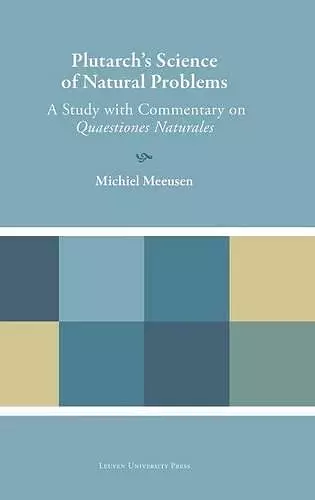Plutarch's Science of Natural Problems
A Study with Commentary on "Quaestiones Naturales"
Format:Hardback
Publisher:Leuven University Press
Published:10th Feb '17
Currently unavailable, and unfortunately no date known when it will be back

The role of natural science in the Roman Imperial Era In his Quaestiones naturales, Plutarch unmistakeably demonstrates a huge interest in the world of natural phenomena. The work of this famous intellectual and philosopher from Chaeronea consists of forty-one natural problems that address a wide variety of questions, sometimes rather peculiar ones, and answers pertaining to ancient Greek physics, including problems related to the fields of zoology, botany, meteorology and their respective subdisciplines. By providing a thorough study of and commentary on this generally neglected text, written by one of the most influential and prolific writers from Antiquity, this book contributes to our better understanding of Plutarch’s natural scientific programme and, the condition and role of ancient natural science in the Roman Imperial Era in general.
This publication is GPRC-labeled (Guaranteed Peer-Reviewed Content).
Em conclusão, Meeusen dá um contributo muito relevante para a reflexão sobre a ciência na Antiguidade Clássica, em especial sobre a etiologia filosófica dos problemata em Plutarco e a sua relação com a tradição. A forma como se abordam as dificuldades de interpretação colocadas pelas QN, levam, sem dúvida, o leitor a deixar-se seduzir pela intertextualidade plutarqueana. Saliente-se, ainda, o facto de este livro está profusamente anotado, com bibliografia específica e muito actualizada. Apesar das várias repetições, muito por causa da metodologia estrutural que foi definida, com conclusões no final de cada secção, estamos na presença de um livro com enorme valor filológico e cultural.Joaquim Pinheiro, Asclepio. 71(2), julio-diciembre 2019, p284. ISSN-L: 0210-4466, http://asclepio.revistas.csic.es
Il libro qui presentato merita, come si sara` compreso, il convinto plauso del recensore, sia per l’ampiezza e la solidita` della dottrina che vi viene profusa, sia per la perizia filologica con laquale e` scandagliato il testo plutarcheo, sia per il sovrano dominio di pressoche´ tutta la letteratura critica disponibile, sia infine per l’acume e la profondita` delle proposte interpretative avanzate.
Franco Ferrari, Athenaeum 109/1 (2021)
Dans l’ensemble ce livre, écrit de manière vivante et « narrative », fournit une importante somme de renseignements sur les rapports entre Plutarque et la science et sur sa philosophie en général. La conclusion générale est convaincante : le fait que Plutarque ait cédé à la tentation des Problemata, qui sont un genre littéraire estampillé comme « aristotélicien », ne le détourne pas de son platonisme. En fait, on pourrait aller plus loin et dire que ce dossier est une pièce supplémentaire permettant de soutenir la compatibilité foncière de Platon et d’Aristote, comme on l’a fait jusqu’à la Renaissance incluse. In fine un excellent ouvrage.Pierre PELLEGRIN, Revue philosophique de la France et de l'étranger, 2019/4 Tome 144, https://www.cairn.info/revue-philosophique-2019-4-page-511.htm
The dissertation is an exceptional one and brings together virtually all of the important scholarship to date on Plutarch’s collection of forty-one (surviving) Αἰτίαι Φυσικαί. This literature is reviewed less in the 127 pages of the “commentary” proper than in the 350 pages of the prologue and the introduction that precede it, where Meeusen explores an ambitious range of subjects, from the precedents (principally the Aristotelian Problems), the position of the Plutarchan collection in the problem literature and in Plutarch’s own corpus, and the relationship of the collection to “zetetic παιδεία” and to “Plutarch’s Platonic World View” (the title of the longest and concluding section of the introduction). Robert Lamberton, Isis, Volume 109, Number 2, June 2018
Michiel Meeusen's book represents an important contribution to our understanding of both the ancient genre of natural aetiology and of the Corpus Plutarcheum. Its main purpose is to assess Plutarch's contribution to natural philosophy by means of a thorough exploration and contextualization of his Natural Problems (Quaestiones naturales), constituting by far the most detailed and complete study of this (at least until recently) neglected work.
Cristian Tolsa, Bryn Mawr Classical Review 2018.01.42
- Winner of Jan Gillis-prijs 2018 (Belgium)
ISBN: 9789462700840
Dimensions: unknown
Weight: 1361g
570 pages